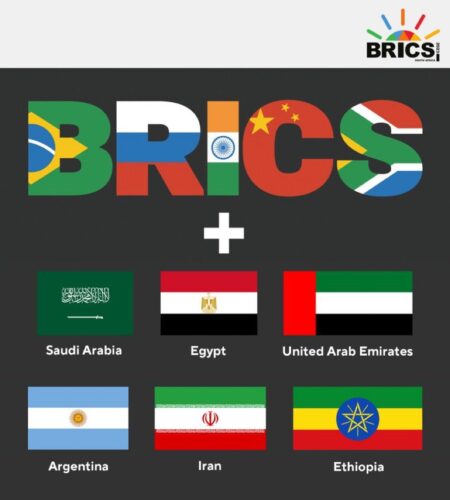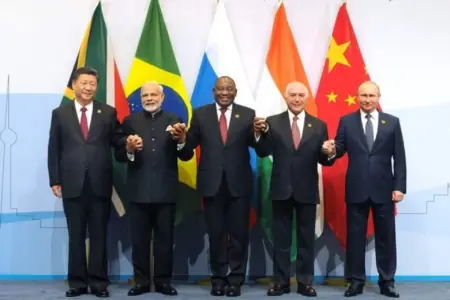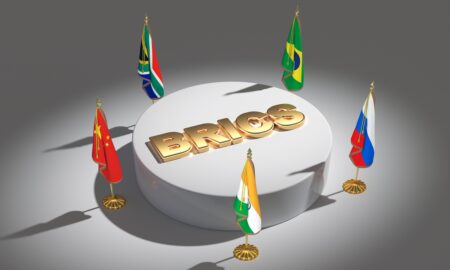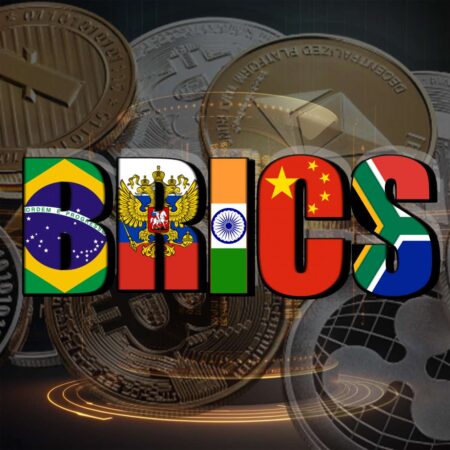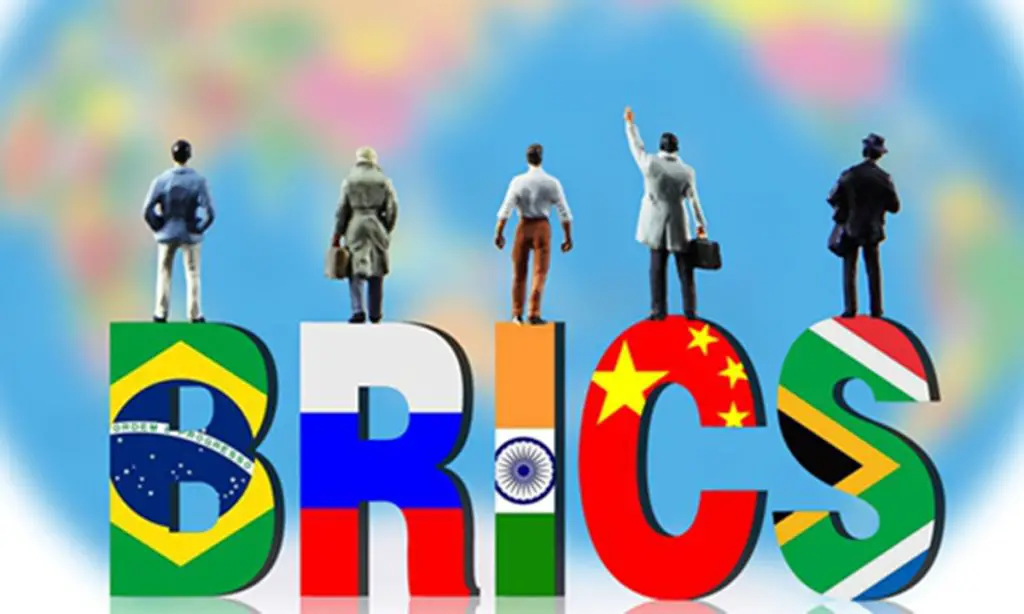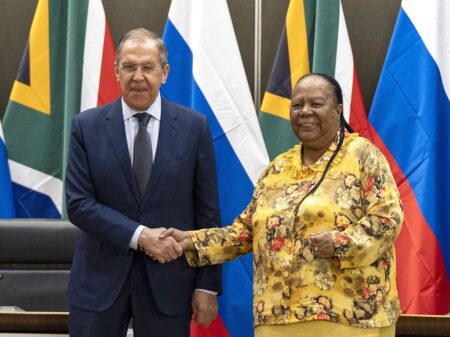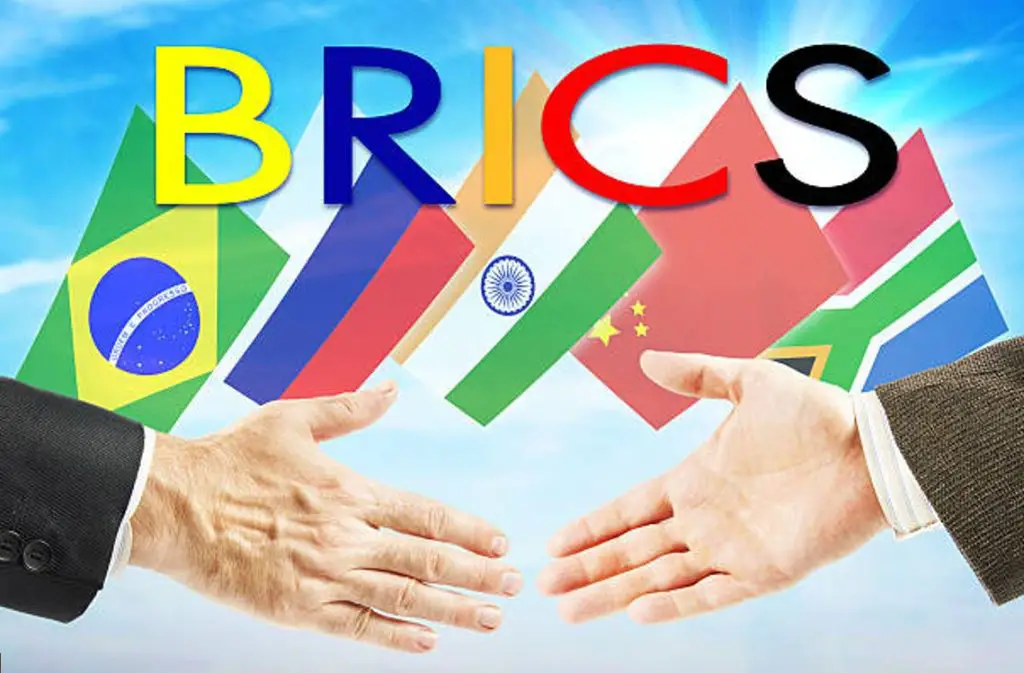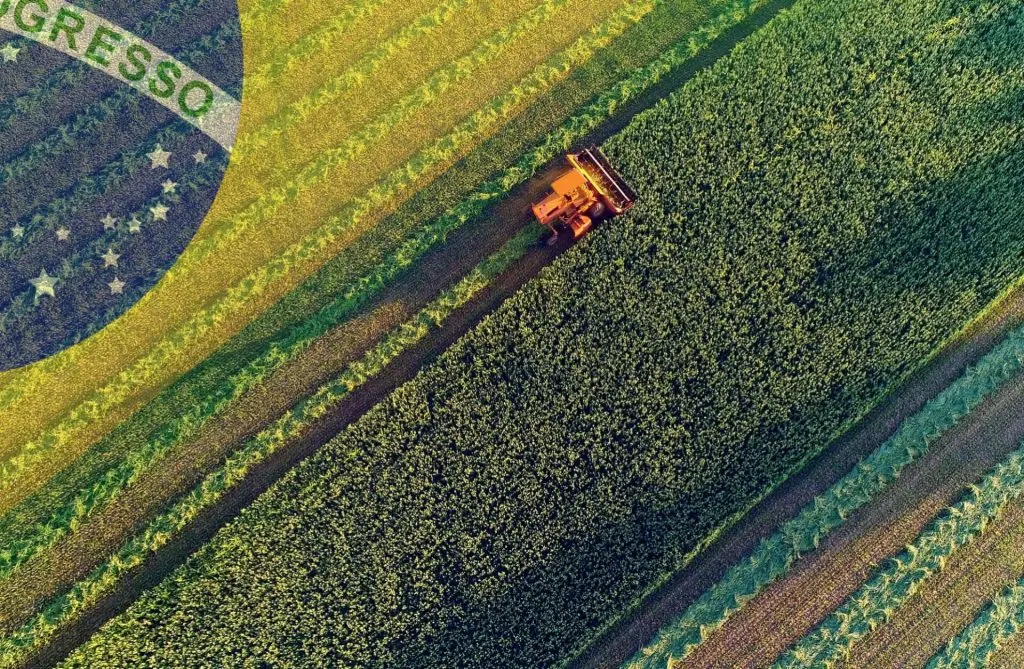- How South Africa plans to counter the negative impact of Trump tariffs sting
- Africa’s BPO industry enters AI era with 40% of tasks at risk by 2030
- Trump tariffs sting set to ruffle several economies in Africa
- Africa Energy Bank secures key backing from Nigeria, Angola and Ghana
- AIM Congress 2025 gets a boost as International Development Bank signs on as gold sponsor
- African energy: Opportunities and challenges presented by Russia’s investments
- Africa’s smart farming push—a revolution or a mirage?
- BRICS summit in Brazil to focus on global governance reform
Browsing: BRICS
- Egypt and Ethiopia will join BRICS alongside Saudi Arabia, Iran and Argentina starting January 1st, 2024.
- This takes membership into the bloc to three countries across the continent after South Africa.
- With the inclusion of Iran, Saudi Arabia, and the UAE, three major oil-producing nations globally will become part of the bloc.
Egypt and Ethiopia alongside oil-rich Saudi Arabia, Iran and Argentina have received an invite to join the BRICS bloc, originally formed by Brazil, Russia, India, and China in 2009. The momentous shift could reshape the global economic landscape and will take effect 1st January 2024.
Notably, this expansion comes at a time when geopolitical tensions between the West and the East have been escalating. In particular, the inclusion of Iran and Saudi Arabia in the BRICS bloc indicates a strengthening of the China-Russia-led coalition that could challenge the influence of Western powers.
South African President Cyril Ramaphosa, who …
- Heads of State from China, Brazil, and India, except Russia will attend the 15th BRICS summit in Johannesburg South Africa, starting August 22.
- President Vladimir Putin will participate in the summit virtually but will be represented in Johannesburg by Foreign Minister Sergei Lavrov.
- The bloc is also expected to discuss how to boost local currency fundraising and lending within the New Development Bank.
The five nations, Brazil, Russia, India, China and South Africa (BRICS) are now a band of economies showcasing their ambition to maximize their emerging economies potential, across geopolitics axis. In one day time, heads of state from China, Brazil, and India, (except Russia) will attend the 15th BRICS summit in Johannesburg South Africa from August 22-24.
South African President Cyril Ramaphosa, Chinese President Xi Jinping, Brazil’s President Luiz Inacio Lula da Silva and Indian Prime Minister Narendra Modi are expected to discuss a number of items as …
The BRICS countries bear a profound responsibility amid a shifting global economic axis. They have the extraordinary chance to reshape the world order, bestowing more significant equity and amplified voice upon the realms of the Global South.
A defining moment in the global economic axis awaits as the BRICS Summit 2023 gathers in South Africa. It signals the member countries to seize this opportunity to shape an unprecedented global economic governance system, an inclusive, all-encompassing, and efficient system.…
- As of 2021, the value of Brazil-Africa trade was $7.4 billion, being 56 percent drop from $17 billion in 2011.
- Brazil’s energy giant Petrobas left Africa in 2020, selling off its subsidiary, Petrobas and Gas BV.
- President Lula: “Brazil would not be what it is today without the participation of millions of Africans”.
The Brazilian Trade and Investment Promotion Agency (ApexBrasil) has mapped out potential investment and trade opportunities across Africa, a pointer to a new era of economic relations between the two regions that literally sit on opposite sides of the south Atlantic Ocean.
The move is part of the organ’s broader efforts to promote Brazilian products and services abroad and attract foreign investments to strategic sectors.
Historically, it is only fair that Brazil increases its economic and bilateral relations with Africa, a continent where over half of her population trace their origin.
After a recent major drop in …
In recent months, the discourse about de-dollarisation has gained momentum. The sanctions against Russia have exposed the danger of over-dependence on the US dollar in international trade. The recent foreign exchange challenges have also recharged the growing efforts to bolster other currencies.
De-dollarisation could soon become a reality. A BRICS substitute to the dollar could enjoy high prospects for success, a former White House adviser, Joseph Sullivan, has noted. Sullivan served as a staff economist at the White House Council of Economic Advisers during the Trump administration. According to him, a potential BRICS currency poses a unique threat to the dominance of the US dollar in international trade.…
The global financial landscape has undergone a remarkable transformation in recent times. Remarkably, the issue of the de-dollarization of international trade is slowly but steadily gathering momentum. A rising trend toward de-dollarization is challenging the longstanding supremacy of the United States in the international financial system. As the dominant global reserve currency, the US dollar remains pivotal in international trade, investment, and financial transactions.…
- The prospect of establishing a common currency will be a top agenda at the upcoming BRICS Summit in Durban, South Africa later this year.
- The Shanghai Cooperation Organization (SCO) is working towards trading in their own national currencies.
- Roughly 40 percent of international trade transactions in goods are invoiced in dollars
The prospect of establishing a common currency will be a top agenda at the upcoming BRICS Summit in Durban, South Africa later this year.
Should the common currency be formed, it will be based on a basket of the currencies of the BRICS countries; the Chinese RMB Yuan, the Russian Ruble, the Indian Rupee, the Brazilian Real, and the South African Rand.
Russian Foreign Minister Sergey Lavrov has on several occasions announced plans by the BRICS countries to unify their currencies and untangle themselves from dollar dependency.
At a media conference during his Africa tour at the start of …
- As a signatory to the ICC, South Africa is under a legal obligation to heed the warrant and arrest the leader of Russia.
- The European Union, as well as the United States, have all sent diplomatic envoys to South Africa urging the administration in Pretoria to broker some kind of peace talks.
- South Africa’s Minister of International Relations and Cooperation Naledi Pandor raised the issue of double standards in the ICC.
South Africa has extended an invitation to Russia’s President Vladimir Putin to attend the BRICS Summit later this year in South Africa amidst an arrest warrant issued by the International Criminal Court (ICC) on Putin for the invasion of Ukraine.
BRICS is made up of the world’s largest emerging economies of Brazil, Russia, India, China, and South Africa. The five countries will be holding their 15th annual summit in Durban South Africa later this year.
Following the issuance of …
China presently has the largest sum of foreign exchange reserves in the world. When its over US$ 3 trillion in reserves is added to the reserves of the other BRICS member states the questions as to why they cannot issue their own currency start to grow louder.
Talks of a common currency fizzled out as more pressing national and international matters eclipsed the idea. This year 2022 has seen renewed calls for a common reserve currency emerge once again. This time Russia is leading the call for the creation of a reserve currency that will be an alternative to the United States dollar as a mechanism for the settlement of international transactions.
Russia’s motive for making such a call is obvious, the country has been at war with Ukraine since February 2022. This aggression against Ukraine has earned Russia some of the most stringent economic sanctions in history. What has …
According to Statista, agriculture contributes at least 4% of the annual value added to the gross domestic product of Brazil. It accounts for at least 9% of the people who are employed and able to work. On the face of it reading numbers 4% and 9% seem like they are nominal until one considers the sheer size of the country of Brazil in terms of land mass. Brazil is one of the largest countries in the world in terms of land area. It sits on no less than 8.5 million square kilometres.
Of this land mass, approximately a third is used for agriculture. For perspective’s sake, Brazil is the fifth largest country in the world after Russia, Canada, China, and the United States. The Brazilian Report states that all the countries that make up the European Union would fit inside Brazil’s borders!
To bring the perspective much closer to home, …





